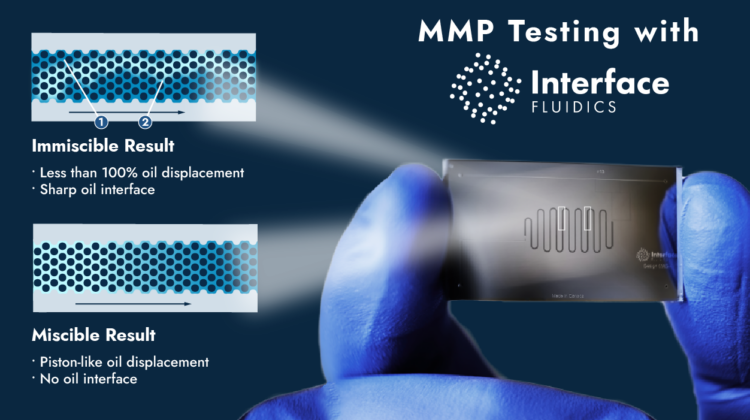
The oil and gas sector’s digitization presents an opportunity to the tune of $2.5 trillion of value, according to an Accenture report titled “The Digital Energy Revolution: Are You Ready?”
However, the World Economic Forum reports the industry has been slow to adapt to the ongoing digital transition.
Interface Fluidics has nonetheless been making waves in Alberta’s oil and gas industry with cutting-edge technology since the firm was founded in Edmonton in 2015.
The company specializes in microfluidics, a field that involves analyzing fluids at the smallest possible scale, and is using this technology to transform the way oil and gas companies operate.
“We are a technology company providing energy industry clients insights into the interactions and properties of reservoir fluids to help them improve their financial performance, reduce their carbon footprint, and ensure the responsible development of their oil and gas assets,” the startup states online. “As a next-generation reservoir fluid testing company, Interface Fluidics uses innovation to realize a competitive advantage: breathing new life into the petroleum industry.”
By analyzing the properties of oil and gas reservoirs at a microscopic level, Interface Fluidics is able to provide companies with valuable insights and data that can help them optimize their production processes. This technology is particularly useful for companies that are operating in unconventional reservoirs, such as shale, where traditional methods of analysis are not always effective.
“Our testing technology shows you how fluids behave at the pore scale and provides critical phase behaviour information for building computer reservoir models,” the company explains. “Interface solutions have helped the energy industry cut chemical costs, increase ROI, and take the guesswork out of operations—smaller samples also mean less energy use and lower emissions.”
Interface Fluidics has developed a suite of microfluidic-based fluid analysis services that can provide oil and gas companies with information on everything from the properties of the reservoir to the performance of individual wells. By using this data to make informed decisions, companies can optimize their production processes and improve their bottom line.
Technologies like the Internet of Things and automation “are having a monumental impact on hydrocarbon extraction,” according to the company, “and we’ve only scratched the surface of their potential to transform the industry.”
With the digitization market undergoing a boom, technology that might have been far-fetched ten years ago is now the competitive edge companies seek, Interface says. As the world’s demand for energy continues to grow, the industry is under pressure to become more efficient and sustainable; Interface Fluidics believes it is developing tech which has the potential to shape the future of the oil and gas industry.
Who is behind this potentially transformative innovation? The Alberta cleantech company was launched by David Sinton, Tom de Haas, and Stuart Kinnear.
As executive technology advisor, microfluidics researcher Sinton provides visionary direction and expertise to Interface’s technical development and training processes. Meanwhile, chief technology officer de Haas leads Interface’s operations and the development of Interface’s automated nanotechnology platform. Kinnear, chief executive, provides industry leadership from over a decade managing teams in oil and gas.
In 2019, the company garnered US$4.5 million from Techstars and others, and secured another US$5.4 million in 2021 from Equinor Ventures and others, which spurred Interface to double their Alberta headcount through 2022.
“Interfaces’ technology is making a difference in how decisions are being made for multinational energy companies,” Audun Abelsnes, Managing Director of Techstars Energy Accelerator, stated at the time of the transaction, “and we are very much looking forward to their continued success.”
“Their technology could support the management of our existing oil and gas assets and shows potential for applications in carbon emissions reduction,” Gareth Burns, Vice President of Equinor Ventures, added on the follow-up investment.
In 2023, Interface Fluidics continues working on developing other new technologies that could have a major impact on the industry.
The company operates both a research laboratory in Edmonton and more recently a corporate office in The Edison in Calgary as it advances innovation Alberta’s cleantech economy.


Leave a Reply